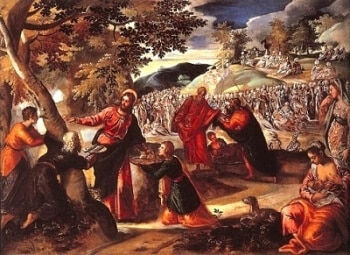 (Is 25:6-10A; Ps 23:1-3A, 3B-4, 5, 6; Mt 15:29-37)
(Is 25:6-10A; Ps 23:1-3A, 3B-4, 5, 6; Mt 15:29-37)
Something unusual is going on in today’s selection from the Gospel of Matthew, which I’m pretty sure I’ve never considered before. In the first part of the selection, it says, Great crowds came to him, having with them the lame, the blind, the deformed, the mute, and many others. They placed them at his feet, and he cured them. Then it spends a few lines talking about how the crowds were amazed to see the people healed.
A little while later, it talks about the miracle of loaves and fishes. Again, pay attention: Then he took the seven loaves and the fish, gave thanks, broke the loaves, and gave them to the disciples, who in turn gave them to the crowds. They all ate and were satisfied. They picked up the fragments left over–seven baskets full.
Did you notice anything unusual there, from a literary point of view?
Imagine if I were telling the story of how I saved the lives of folks in a burning building, and I said, “I saw that the building was on fire, and the front door was locked, and I noticed some people on the second floor, and they were shouting for help, so I saved them.”
If I told that story, your immediate inclination would probably be to say, “Yes, but how did you save them?!”
However, twice in rapid succession we have two amazing actions from Christ where absolutely no effort is spent at detailing how those events actually happened. There was no mention of pillars of fire, or glowing lights, or choirs of angels, or anything. In the first half of today’s Gospel, there were sick people, and he cured them; in the second half, there were hungry people, and Jesus’ disciples passed around food, and they were all satisfied.
We all know the Bible is divinely inspired. And — from a literary standpoint — I generally believe that the text that’s there is there for a purpose . . . and most text that isn’t there isn’t there for a purpose. On the day where the events of today’s Gospel take place, we don’t have any description of the weather, or Jesus’ attire, or local events, or anything like that. Why? Because they’re not really important to the underlying nature of the story.
In the same way, I can’t help but feel that the hows of today’s miracles aren’t important.
One alternate explanation I’ve heard for the miracle of loaves and fishes is that some of the attendees there who had food were so inspired by Jesus’ words and message that – when the baskets of food were being passed around – they shared what they had, ensuring that there was enough to go around. (This communal way of living was emulated by early Christians, as noted in Acts 2:42-47.) I don’t know if I buy that interpretation, but – given humanity’s often selfish nature – the sharing of food with strangers would be nearly as miraculous as Jesus creating fish and bread from nothingness.
And that miracle we create among ourselves is proof that the Spirit is working, that the words and deeds of Jesus have turned our hearts from sin. The ending of the classic film It’s a Wonderful Life has as its “miracle” the people of the town of Bedford Falls contributing money to aid the in-need George Bailey. Yes, that movie has divine elements – in particular, the forces of Heaven working to help George – but the climax is no less miraculous than if an angel had summoned a basket of cash to help George.
So, why are the miracles of Jesus often light on details? Perhaps because those details aren’t important; what’s important is that God acted, seemingly impossible good was done, the people saw, and they were amazed. God is acting at all times in our lives. He wants us to do good. He wants us to challenge ourselves in seemingly impossible ways. He wants us to know and understand that miracles aren’t artifacts of a bygone pass; they are a real and present possibility for us.
Miracles happen. God has performed miracles directly. He has worked miracles through the saints. He has delivered miracles through others in our lives, with words and deeds in times of need. He calls us endlessly to bring our hearts closer to Him, so that we may serve as a conduit of God’s miracles and love for others. The details of how miracles come to fruition are often unimportant; what’s important is that they’re real, they’re proof of God’s infinite love, and it’s our duty to observe and be amazed . . . and do our part to make them happen.
